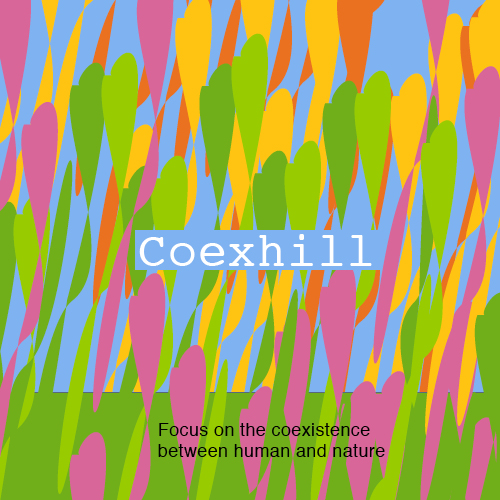The Hub & town education
example: Coexhill

Coexhill
Focus on coexistence between human and nature
What if we built houses like mountains with an open side and maybe some shafts? This way we could go on a walk on our houses, and we could use the surfaces efficiently by planting gardens and orchards along the slopes and tops of the houses.
The mountain houses are one of many ideas the inhabitants of Coexhill will test in order to find out how humans can coexist with nature.
Coexisting with nature means to live and act in a way that causes no damage or harm to any part of the natural world, which, funny enough, includes the human.
In its first years Coexhill is basically one big laboratory. No one owns anything, or lives permanently in one place. Instead most inhabitants take part in testing, building and tinkering to create models for coexisting with nature which can be used by other towns and cities.
Education for all age-groups is another major task for Coexhill since the more people see and understand the benefits of nurturing nature the healthier and happier everyone will be.
The Hub & town education
All educational facilities in town are linked to the Hub, and all administrative tasks of the schools, training centres and universities are done via the town’s space on the Hub.
Case 1: The Montieris and the Shuffles
The families, including their children, meet for an education council. Both families presently live and work in the stilt-house experiment part of Coexhill. They love this area, but the children have asked for some changes.
Bran, the youngest Montieri, five, wants to move to the gardens district which includes the most fantastic learning and adventures gardens school in Coexhill. Mitch, the youngest Shuffle, six, also wants to go there, and he points out that after all the experiences with living on stilts, it might be great to take part in the cave-dwelling project which is next to the gardens school, plus Mitch knows that his mother has been eyeing that project for a while. Marla and Lee, the older children of the families, fourteen and sixteen, share an interest in everything that has to do with water, and they would like to change schools and continue their education at the Riverbank College.
After a meal and some further discussions, the two families log into their Hub accounts and connect online for a joint Hub session. Next they connect to the Da Vinci Hall and open a second window to search for project openings and available accommodations. All three areas are connected for this session, meaning a change in a school, automatically triggers new results for accommodation and so on.
Martha Montieri enters the children’s wishes in the Da Vinci Hall window. It turns out the transfers are no problem, and Martha could just enter the date of the transfer and that would be it. In the other windows a number of options for the families appear, both in terms of jobs and accommodations. Now the families can play through scenarios regarding the options, like how long does it take to get to school if we moved to the cave project, which additional training would the parents need, are training spots open and so on.
In the end, and after more discussions, the families decide to stay together, to move to the tree houses project and to add a cave studio for Hera Shuffles. This means longer distances to the schools for the children, but the older ones can paddle along the river from here, and the younger ones can use the treetops alley to get to the edge of the gardens district, and from there it’s only another ten minutes through The Body Garden to get to their new school.
All adults need extra training for their new tasks in the tree houses project. Once all decisions are made, the families enter the details on the Hub. Three days later, all registrations and applications are confirmed, and all paperwork is done automatically by the Hub.
Case 2: Lila, a student from a different town
Via a town guest account Lila applies for a spot at the Coexhill university to continue her studies in ecology. The university has compiled an online questionnaire and test. Lila does both. Some days later, she gets an invitation to stay in Coexhill for three weeks to get to know the different projects. The Hub provides Lila with the contact details for her mentor and for her coordinator. Lila can communicate with both via the Hub. The Hub automatically compiles a schedule for Lila which is checked by her coordinator, and the Hub books an accommodation, registers her as a guest and opens a temporary town bank account for her.
After the three weeks of working in Coexhill, Lila is informed by the university that her input convinced them to accept her as a student. And again, all the rest is nearly automated as soon as Lila accepts the acceptance and points out which subjects she would like to focus on.
When Lila returns to the town a few weeks before the start of term, she finds a room waiting for her and all paperwork done by the Hub.
Case 3: Alva, a programmer
Alva is part of the simulations team which support all projects in Coexhill. She loves her job, and it’s usually fun to have someone storm the office and say: ‘Can we have a simulation to see what happens if we let a river run across a house.’
Yes, people came with the craziest ideas. But usually, no matter how crazy, there was something to discover.
Maybe it was the fact that she always sat inside and was never on location when someone came up with yet another crazy idea, that made her consider to add some skills to her portfolio. She loved her job, but she liked the idea of having another one, of learning something completely different.
When her mind was made up, Alva logged into the Da Vinci Hall on the Hub. The Hall offered many options and Alva decided to be open minded and start a search from scratch. Her first keywords were: additional profession, outside, multi-project, like trees, don’t like big animals.
The first search results were interesting and after adding some more keywords, she found a training course for a tree minder. Tree minders were people who learned everything there is to know about the local trees, including what they needed to thrive, and how they could be used by humans in a sustainable way.
Alva gave it a few days and some discussions with friends and colleagues, then she applied for the training course.
The Hub automatically gave her several options of how she could split her time between her profession and her new studies. Alva smiled. She had been one of the programmers responsible for these simulations.
When all was decided and confirmed, the Hub added some links to the Hub shopping mall for adequate equipment and attire for Alva’s additional profession, and some links to books at the Hub Library, plus relevant links to videos and movies at the Hub Cinema.
